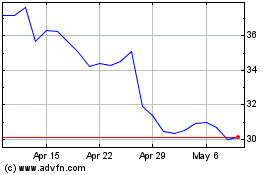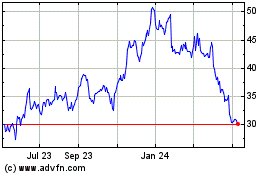Two years ago, Facebook Inc. offered its in-house recruiters an
incentive to help diversify its largely white, largely male
workforce.
Previously, recruiters were awarded one point for every new
hire. Under the new system, they could earn 1.5 points for a
so-called "diversity hire"—a black, Hispanic or female
engineer—according to people familiar with the matter. More points
can lead to a stronger performance review for recruiters and,
potentially, a larger bonus, the people said.
When the numbers didn't move, Facebook sweetened the deal.
Starting last year, recruiters earned two points for a minority
hire, or twice as much as for white or Asian males, who already
were well-represented within its technical ranks.
Even so, Facebook has shown little progress. Last month, the
company said 4% of its U.S. employees were Hispanic and 2% were
black, the same as the two prior years. Women made up 33% of its
global workforce, up from 31% in 2014.
A Facebook spokeswoman declined to comment on the incentive and
wouldn't say if it is still in use. "We continue to experiment with
a variety of approaches to help in our efforts to increase the
diversity of our workforce," she said.
The move shows how Facebook is applying its trademark
data-driven approach to one of the tech industry's most stubborn
problems: the homogeneity of its nearly 15,000-person workforce.
But its lackluster results reflect the limits of that method when
tackling deep-rooted issues such as inequality.
"All of us are lost with diversity," said one former Facebook
recruiter. "We're all rushing and sprinting to get diversity
numbers higher and higher than other companies. It's become a
competitive number."
Facebook says it wants its workforce to better reflect the
diversity of its 1.7 billion monthly users—85% of which are outside
the U.S. and Canada. But last month, it said it couldn't
substantially increase the diversity of its workforce because there
weren't enough qualified women or minority candidates. That drew
fire from tech diversity and inclusion leaders on social media.
In Silicon Valley's competitive job market it is difficult for
recruiters, even at top-tier companies such as Facebook, to meet
their hiring goals. That especially is true as tech giants jockey
to make their offices more diverse.
Intel Corp. has paid its employees double referral bonuses for
women, minorities and veterans. Other companies take into account
how many women top managers hire when calculating their
bonuses.
Incentives such as those used at Facebook and Intel signal a
desire for more diversity, but they are "not a really effective way
to change behavior. It can backfire," says Harvard University
professor of sociology Frank Dobbin, who recently wrote an article
titled "Why Diversity Programs Fail." Using a hiring incentive
program can create the assumption that these candidates are "just
an add-on to the real interview list," he said.
The Facebook spokeswoman said the company makes clear that
diversity "is necessary and not an add-on."
The extra incentive points—awarded in job categories that are
too homogenous—are an unusual effort to expand Facebook's
"pipeline," which is the pool of candidates recruiters identify to
interview for a position.
At Facebook, like at other tech companies, recruiters bring in
candidates, but it is up to hiring managers to make job offers.
Therefore, attracting more candidates doesn't necessarily result in
a more diverse workforce.
"Diversity efforts often focus heavily on recruiters and not
enough on hiring managers," said Joelle Emerson, chief executive of
Paradigm, a diversity consultancy that works with many Silicon
Valley startups.
Facebook recruiters often mined LinkedIn profiles for details
that could serve as a proxy for race or gender: attending a
historically black college, membership in an organization for
Hispanic engineers, or a profile picture that looks diverse. Some
compiled lists of the 100 most-common Hispanic names in the U.S. to
plug into search strings, according to people familiar with the
matter.
A recruiter only got the diversity credit if a candidate—either
internal or external—identified himself or herself as a member of
an underrepresented group during Facebook's application process,
the people said.
What counts as a "diversity" hire depends on the job. Technical
roles are filled mostly by white and Asian men, creating a
disproportionate desire for black, Hispanic and female engineers,
as well as veterans and people with disabilities.
In divisions such as communications and human resources, where
women already are well-represented, there was no bonus for hiring a
woman.
Former Facebook recruiters say they had mixed feelings about the
extra-credit program. Some were encouraged by the incentive, and
identified a more diverse group of candidates. Still, they said it
wasn't enough to overcome a broader bias within Facebook and other
tech companies for candidates who attended prestigious schools.
Facebook says it recruits from hundreds of colleges in the U.S.
alone.
In the second half of last year, a number of Facebook recruiting
teams failed to reach their goals for diversity hiring, said some
people familiar with the matter. There were signs of progress,
however: Facebook's newly hired senior leaders were more diverse.
While existing leadership was 3% black and 3% Hispanic, 9% of
Facebook's senior hires between July 2015 and July 2016 were black,
while 5% were Hispanic.
(END) Dow Jones Newswires
August 16, 2016 19:05 ET (23:05 GMT)
Copyright (c) 2016 Dow Jones & Company, Inc.
Intel (NASDAQ:INTC)
Historical Stock Chart
From Mar 2024 to Apr 2024

Intel (NASDAQ:INTC)
Historical Stock Chart
From Apr 2023 to Apr 2024
